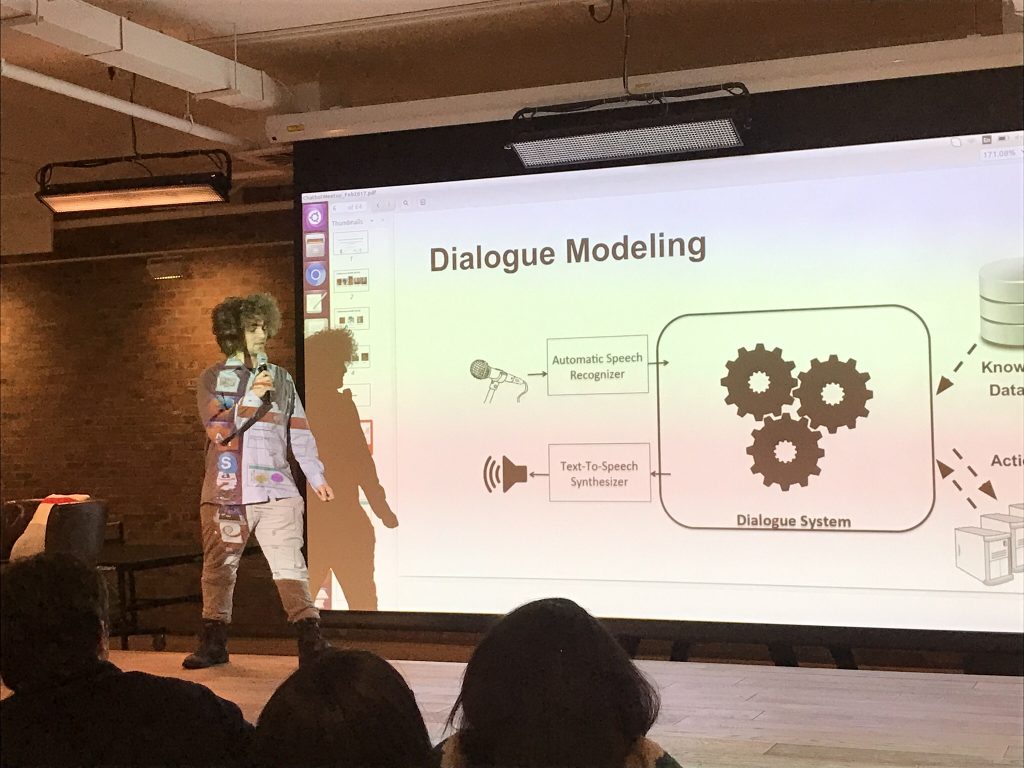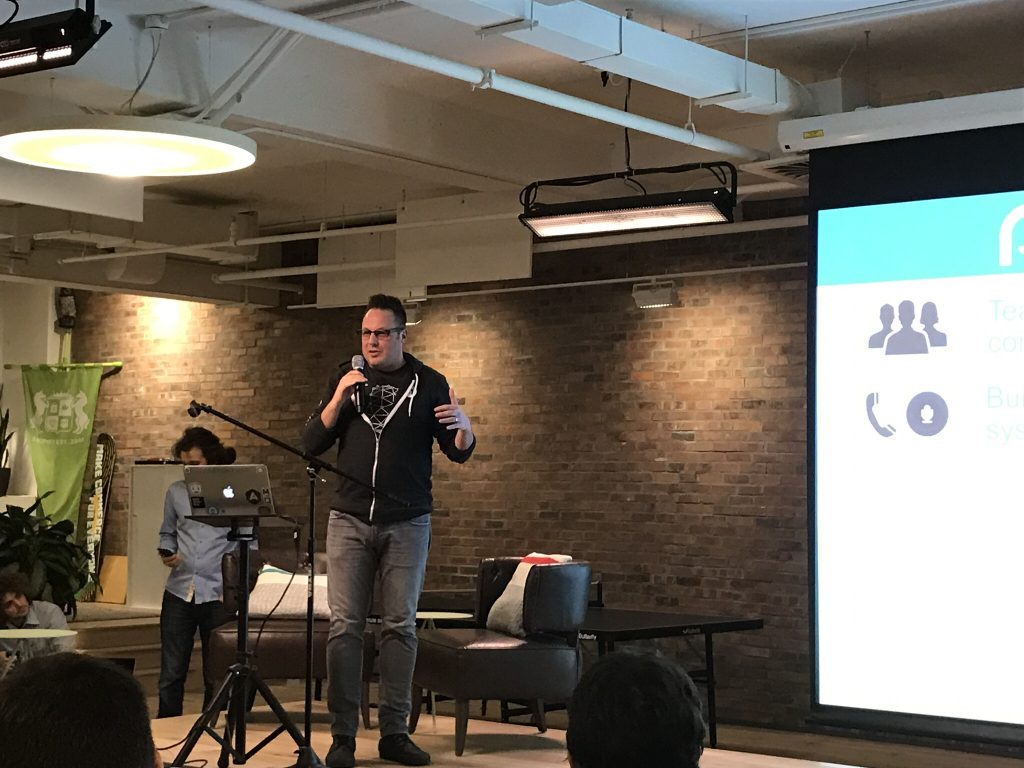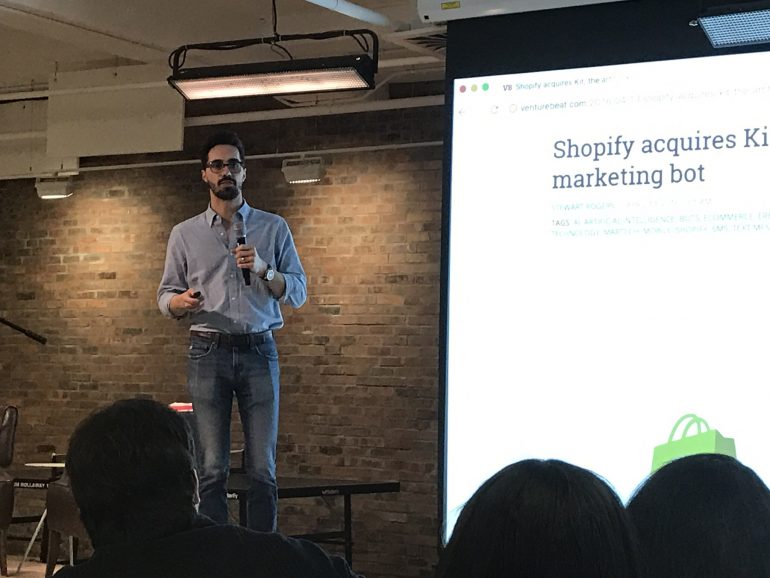With the advent of chatbots, there is no question that retail and customer service is already changing in ways that just a few years ago were impossible to even imagine. So what does the future of online retail look like in the age of bots, and how is AI changing this landscape?
At last Wednesday night’s inaugural Chatbots MTL meetup, Montreal’s growing AI community gathered at Shopify to learn about this new frontier from Iulian Serban, PhD candidate studying with Yoshua Bengio, Aaron Courville, and Joelle Pineau at the University of Montreal; Andy Mauro, co-founder and CEO of Automat, a conversational AI startup that is focused on enabling businesses to have personalized, one-on-one conversations with their customers; and Michael Perry, founder of Kit, a virtual marketing assistant that was acquired by Shopify in 2016.
The goal of the MTL-Chatbots meetup is to share knowledge in the burgeoning chatbot industry. With the rapid changes that we are seeing in AI, it’s no longer a question of the validity of using bots to communicate with customers, but rather how best to harness its potential, and how to create neural networks so complex that we can feel certain that the bots can give clients the answers they are looking for.

While Serban showed that the research for deep learning models for dialogue and question-answering systems still has ways to go before it’s accurate, there has already been a huge amount of progress in the last couple of years. His team is working to build models to solve customer service problems for technology companies, something that is far more complex than simple transactional conversations that take place in sales or B2C conversations. While they currently have about 10 percent correctness, they’ve made a huge jump from where they were in 2015.
“We’ve really improved on tech support,” Serban told the audience. “We’ve gone from an F1 metric of one, which means that we’re correct one percent of the time — which is terrible right? — to being correct about 10 percent of the time.”
For extremely complicated problems — for instance, asking a bot detailed questions about why your software isn’t working correctly — the bot needs to gather information from the customer, and dig through massive volumes of information to present the correct solution.
“We are making progress, but it’s slow progress,” he continued. “We’ve kept pushing further and further… so what we are always trying to do is to learn from our data. So every new step we’ve done, we’ve pushed all of our model parameters in the right direction.”
“I think we’re still paddling into these waves and there’s a lot of innovation that’s going to take place.” – Michael Perry, founder of Kit
In terms of pushing toward solving real business problems, Mauro had a lot of great answers. The company, which uses chatbots to create bi-directional conversations with customers, is changing the way that ecommerce sales work. Rather than browsing online catalogues or sending an email with a question and passively receiving information, Automat wants to build personal relationships with customers.
“We asked the question: what would happen if technology allowed you to have personalized one-on-one conversations at scale with all of your customers?” said Mauro. “If 20 years ago, at the birth of the web, we had perfect AI, would we have built the web? Would that have been how we built storefronts and did commerce online? No way. Everybody knows that direct sales beats handing somebody a catalogue and walking away.”
Automat’s system learns from the customers and helps solve problems. This drives digital sales and helps customers to enjoy the sales process. While Mauro didn’t disclose who his customers are (aside from saying that they’re multinational corporations), he did show the audience a case study in which a social media influencer bot helped to sell makeup, and the bot got significantly better results than the human influencer. Automat is among the 14 companies Slack invested in last year.

For smaller businesses, bots can also help build success. Kit’s Perry wanted to find a way to simplify marketing for small business owners, and realized after a text conversation with his grandmother that just about anyone can use messaging. After making it simple for small business owners to create Facebook ads by texting their bot, they started developing the app for all the other marketing needs of small online retailers and other business owners.
“We started quickly using our platform and our simplistic technology to replace all of the other things they were required to do throughout their day to find success with their business,” said Perry.
“When you really understand your customers — that’s the key thing, knowing what their needs are — then you can design a solution that can fix their problems.”
He said that we are just in the infancy of harnessing bots’ potential. “I think we’re still paddling into these waves and there’s a lot of innovation that’s going to take place.”


